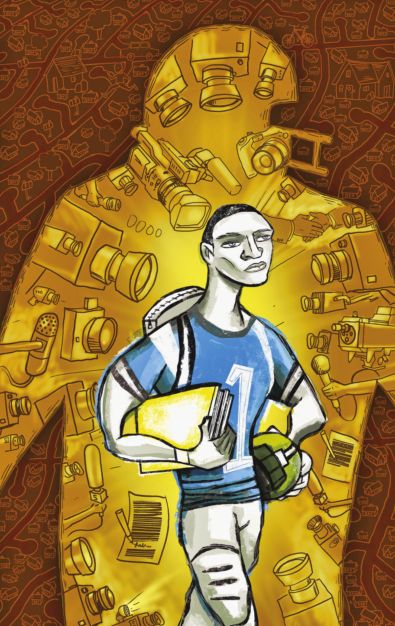Throwing in the towel
They’re talking about reforming college sports – again
DYSPEPSIANA | James Krohe Jr.
It’s mid-summer, but the thoughts of every red-blooded Illinoisan are already turned to autumn. The fields resound with the satisfying crunch of pads against pads, helmet against helmet, brain against skull as college football squads go through their two-a-days.
College football, like basketball, is a tribal thing, and I’m not of that tribe. It isn’t that I’m anti-sport – far from it. In fact I’m a hopeless sports romantic. Cheer on the home team? Yay! But only when it is a home team and not a bunch of itinerant semipros auditioning for the big-time. In what way, for instance, is the Fighting Illini “my” team to the Illinois citizen? Of the current football roster of 115 players, only 42 are from Illinois. If I want to watch the pride of Ohio or West Virginia perform, I’ll go to Ohio or West Virginia to do it.
Which I won’t. In fact, watching anything in Champaign with pride has become impossible. It would take more education that I have, for example, to grasp why the state should not be embarrassed that its highest paid public employee is the head coach of the U of I men’s football team. Or why the taxpayers should subsidize what amounts to a farm system for the pro leagues with the colleges doing the recruiting and development while the pros reap the rewards. Or
why underthe-table payments, doctored grades, academic double standards
and the thuggish jock subculture should be tolerated on campus.
We
often hear the plaint that if money sports are banned or scholarships
curtailed, our student-athletes will not get educations. They won’t be
able to get educations as athletes, no. But if they are academically
qualified, athletes would still have open to them the same grants loans
and scholarships that any bright, ambitious kid has. The academically
challenged athletes would be better off too, without the cosseting that
cruelly deceives them about their capacity to cope with the real world
when the university tosses them out like an empty Gatorade bottle.
Now,
universities exploit all their students in various ways, from
undergrads to graduate assistants. Nor can institutions that tolerate
boozing and bad sex claim to be concerned about the welfare of their
young charges. But the exploitation of gridiron and hoops players is
breathtaking. The profits of these usually black and poor players
subsidize the minor sports preferred by their better-off white
schoolmates. As for marketing, I never cheered on Ed O’Bannon when he
was the 1995 college basketball player of the year at UCLA, but I am
today. O’Bannon has been joined by Oscar Robertson and Bill Russell in
suing the National
Collegiate Athletic Association on behalf of college athletes
everywhere, seeking a cut of what the schools make by selling rights to
use their players’ likenesses – their own faces! – in TV ads, video
games and on clothes.
For
some time, sensible observers suggested that football and basketball
players at the big schools be paid honestly, as employees of the
university. Richard DeMillo of the John William Pope Center for Higher
Education Policy in North Carolina suggests that a U of I or Indiana U
would simply license its name and logo to a stand-alone, independent
company that would operate its programs. Recruiting, training and other
operating expenses – as well as capital expenditures like stadiums and
training facilities – would be carried on this corporation’s books, not
the university’s.
On July 18 the Trib published
an op-ed by Henry Bienen, president emeritus of Northwestern
University. Bienen points out that student-athletes on scholarship are
already pampered compared to student-students, pocketing as they do free
tuition, room and board and tutoring. Paying them would make those
disparities worse, and also make such sports unaffordable at schools
that don’t make a profit from them, which means most of them.
Those
objections have no weight. The problem is that paying athletes in free
tuition, room and board and tutoring has created a privileged caste on
campus in the first place, one that removing them from the student rolls
will solve.
Dr.
Bienen goes on to say, “Giving up on the idea of student-athletes at
universities would be throwing in the towel.” No, giving up on the idea
of student-athletes at universities would be facing some ugly realities
like grown-ups. NCAA President Mark Emmert replied that any sort of
pay-for-play model would be the death of college athletics. “Then they
are subcontractors. Why would you even want them to be students? Why
would you care about their graduation rates? Why would you care about
their behavior?” I know why you care, Mr. Emmert – to preserve the
façade of amateurism on which the economics of your enterprise depends.
But why should fans care? The only thing that matters to us is
performance on the field. To those who fret that fans and alumni will
not root for a semi-pro team just because it wears the colors of their
beloved alma mater, I say, they do now.
Contact James Krohe Jr. at [email protected].